研究生教材国际学术交流英语-外研版
- 格式:doc
- 大小:153.50 KB
- 文档页数:24
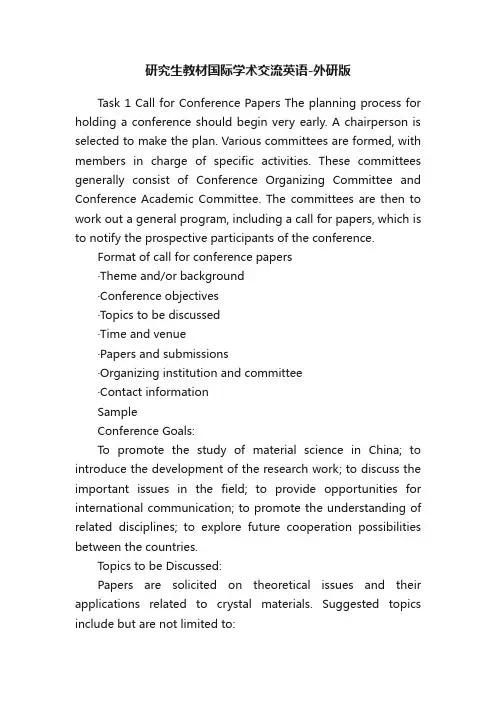
研究生教材国际学术交流英语-外研版Task 1 Call for Conference Papers The planning process for holding a conference should begin very early. A chairperson is selected to make the plan. Various committees are formed, with members in charge of specific activities. These committees generally consist of Conference Organizing Committee and Conference Academic Committee. The committees are then to work out a general program, including a call for papers, which is to notify the prospective participants of the conference.Format of call for conference papers·Theme and/or background·Conference objectives·Topics to be discussed·Time and venue·Papers and submissions·Organizing institution and committee·Contact informationSampleConference Goals:To promote the study of material science in China; to introduce the development of the research work; to discuss the important issues in the field; to provide opportunities for international communication; to promote the understanding of related disciplines; to explore future cooperation possibilities between the countries.Topics to be Discussed:Papers are solicited on theoretical issues and their applications related to crystal materials. Suggested topics include but are not limited to:Papers and Submissions:Authors are invited to submit full papers, up to six pages, with the authors’names and affiliations, complete address (including email, fax and phone number of the corresponding author), before April 10,2006, by email to aa@/doc/91f14474872458fb770bf78a6529647 d2*******.html . The language is Chinese or English. The papers will be reviewed by the program committee based on content, presentation and suitability for the conference. The papers must be in an MS word or Latex format (A4, single space, Songti, 10 points if in Chinese, or Times New Roman, 12 points if in English). More detailed information will be available on the web page: /doc/91f14474872458fb770bf78a6529647d272 83431.html .Useful Expressions and Sentence Patterns1. Call for papers·Papers are being invited for TI 83rd World Conference to be held in Shanghai, May 23-27, 2004.·Titles of proposed papers with a 200-word abstract should be submitted no laterthan May 10, 2006.·The IASTED Secretariat must receive your paper by July 15, 2006.2. Submission·The submitted papers should be original and have not been published elsewhere. ·Best papers will be selected by the Advisory Committee and Program Committee, and the authors a re invited to submit their papers to an international journal. ·For all submissions, please include the following information: title of the paper, name, affiliation, address, phone number, email, andaudiovisual request. ·Abstracts are invited for 20-minute talks followed by 10 minutes of discussion addressing any topic in the areas of Asian environmental protection…3. Format and length·Abstracts should be submitted electronically in an MS Word format and sent by email to the conference secretariat.·Auth ors of accepted papers should send the full text paper in format of PDF or MS Word before September 15, 2006 to aa@/doc/91f14474872458fb770bf78a6529647 d2*******.html with attachment.·All submissions should be in Adobe Acrobat (.pdf), postscript (.ps), or MS Word (.doc) format.·Initial paper submissions should be approximately ten pages.4. Notification of acceptance and refusal·Notification of acceptance will be sent via email by August 1, 2006. ·Receipt of paper submission will be confirm ed by email.·Submissions received after this date will not be given primary consideration. ·Acceptance of the paper will be confirmed by JICC 2006 Program Committee based on content quality of the extended abstract.·Late registration fees or paper submis sions will result in papers being excluded from the conference proceedings.Called to order by the presiding officer主持人致辞roll call点名announcement of quorum宣布大会决议reading of the minutes of the previous meeting宣读前期会议纪要approval of the minutes of the previous meeting通过前期会议纪要related matters相关事宜unfinished business未尽事宜appointments and removal任命及离任nomination and elections提名及选举adjournment休会opening ceremony开幕式keynote speech主题发言forum论坛plenary session全体会议poster session论文展示panel session专题讨论会discussion / question & answer session讨论/提问与回答时间field trip考察活动closing ceremony闭幕式reception/banquet招待晚宴Task 1 Letters of Invitation Before the international conference, the conference host or organizer(s) will send invitation letters to famous scholars and experts in the field and invite them as keynote speakers to the conference. They will also invite other prospective authors to present their new ideas, valuable works, and ongoing research at the conference. These letters are formal letters and therefore should bear all the necessary information about the occasion(s), and express the host’s sincerity and hospitality toward the attendees.在国际会议,会议主持人或组织者()将发送邀请信,著名学者在该领域的专家和邀请他们作为主讲人会议。
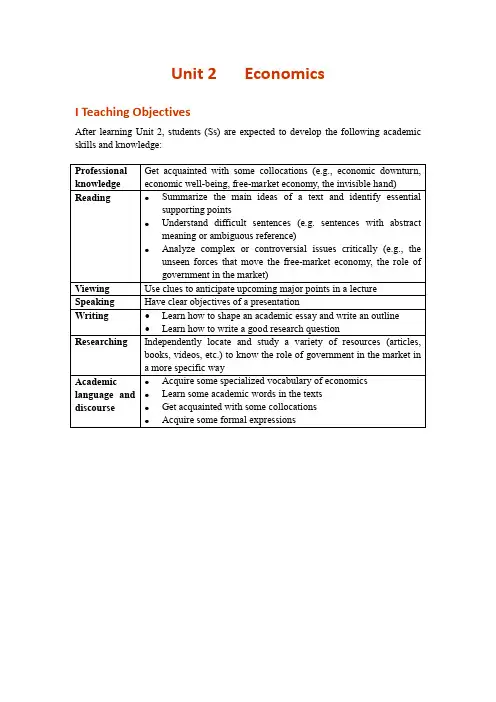
Unit 2 EconomicsI Teaching ObjectivesAfter learning Unit 2, students (Ss) are expected to develop the following academic skills and knowledge:II Teaching Activities and ResourcesReadingText ALead-inTeaching StepsAsk Ss to work in pairs and do the task in Lead-in. Then invite several Ss to share their answers with the whole class.Answer Keys1.The invisible hand.2.Our economic life is made possible by the skill and labor of vast numbers of totalstrangers.The activities of countless far-flung men and women have to be intricately choreographed and precisely timed. However, no one coordinates it, and yet they do cooperate. It’s “the invisible hand” —the mysterious power that leads innumerable people, each working for his own gain, to promote ends that benefit many. Out of the seeming chaos of millions of uncoordinated private transactions emerges the spontaneousText AnalysisTeaching Steps1.OverviewAsk Ss to preview Text A before class. Or, allocate some time for Ss to read the text quickly in class. Then invite several Ss to summarize the main idea of Text A.2.In-Depth Analysis1)Show Ss the following words and ask them to contribute to the class as muchas possible with what they know about these words. Provide additional information in Supplementary Information when necessary.•the invisible hand•free-market economy•economic downturn•An Inquiry into the Nature and Causes of the Wealth of Nations2)Explain some important language points in Language Support to Ss.3)Discuss with Ss the invisible hand in the author’s eyes by doing Task 1 inCritical reading and thinking.4)Organize a group discussion about the questions from Task 2 in Criticalreading and thinking. Encourage Ss to think independently, critically and creatively and share their ideas with each other.Supplementary Information1.free-market economyIn a free market economy, the laws and forces of supply and demand, rather than a central government, regulate production and labor. The prices for goods and services are self-regulated by buyers and sellers negotiating in an open market.Most companies and resources are not owned by the state. Instead, they are owned by private individuals or entities who are free to trade contracts with each other. 2.economic downturnAn economic downturn is a general slowdown in economic activity over a sustained period of time. It occurs when the value of stocks, property, and commodities fall, productivity either grows more slowly or declines, and GDP shrinks, stands still or expands more slowly. It can happen in a specific region (e.g.the Asian financial crisis in the late 1990s) or on a global scale (e.g. the global financial crisis in the late 2000s). The main features of an economic downturn include rising unemployment, falling share and house prices, low consumer confidence and declining investment.4.An Inquiry into the Nature and Causes of the Wealth of Nations(《国富论》)An Inquiry into the Nature and Causes of the Wealth of Nations, usually abbreviated as The Wealth of Nations, is Adam Smith’s masterpiece. It was first published in 1776, and is widely considered to be the first modern work in economics. Through reflection over the economics at the beginning of theIndustrial Revolution, the book touches upon broad topics such as the division of labor, productivity and free markets.Language Support1.Individual buyers and sellers will act according to what is in their own bestinterests. (Para. 2)The phrase “in one’s interest” means “for one’s benefit or advantage”(为了……的利益;为……着想). There are some relevant expressions, such as “in the interest of one”, “in one’s own interest”, and “in one’s best interest”.e.g. It’s obviously in their interest to increase profits.I suspect it’s in your own best interest to quit now.2.Customers are likewise typically looking out for their self-interests. (Para. 4)The word “likewise” is used to signal a comparison that explains how things are similar(同样的;此外).e.g. In this episode, we will likewise deal with another extremely commonquestion.Just water these plants twice a week, and likewise the ones in the bedroom.Other special words and expressions are often used to signal the comparison of two or more people, places, things, ideas, etc. Here are some examples of these signposts for your reference:similarly, both, just as, and also, resemble, parallel, in the same manner, inthe same way, alike, equally3.The market becomes more efficient as buyers and sellers move in the samedirection—as if directed by an invisible hand. (Para. 5)这里的as if用于省略句。
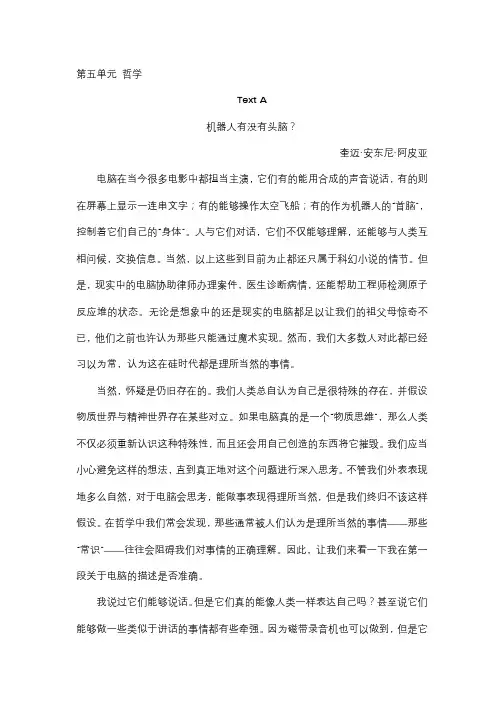
第五单元哲学Text A机器人有没有头脑?奎迈·安东尼·阿皮亚电脑在当今很多电影中都担当主演,它们有的能用合成的声音说话,有的则在屏幕上显示一连串文字;有的能够操作太空飞船;有的作为机器人的“首脑”,控制着它们自己的“身体”。
人与它们对话,它们不仅能够理解,还能够与人类互相问候,交换信息。
当然,以上这些到目前为止都还只属于科幻小说的情节。
但是,现实中的电脑协助律师办理案件,医生诊断病情,还能帮助工程师检测原子反应堆的状态。
无论是想象中的还是现实的电脑都足以让我们的祖父母惊奇不已,他们之前也许认为那些只能通过魔术实现。
然而,我们大多数人对此都已经习以为常,认为这在硅时代都是理所当然的事情。
当然,怀疑是仍旧存在的。
我们人类总自认为自己是很特殊的存在,并假设物质世界与精神世界存在某些对立。
如果电脑真的是一个“物质思维”,那么人类不仅必须重新认识这种特殊性,而且还会用自己创造的东西将它摧毁。
我们应当小心避免这样的想法,直到真正地对这个问题进行深入思考。
不管我们外表表现地多么自然,对于电脑会思考,能做事表现得理所当然,但是我们终归不该这样假设。
在哲学中我们常会发现,那些通常被人们认为是理所当然的事情——那些“常识”——往往会阻碍我们对事情的正确理解。
因此,让我们来看一下我在第一段关于电脑的描述是否准确。
我说过它们能够说话。
但是它们真的能像人类一样表达自己吗?甚至说它们能够做一些类似于讲话的事情都有些牵强。
因为磁带录音机也可以做到,但是它们并不能说话。
当人类说话时,他们用所说的话的内容来表达自己的意思。
为了表达意思,则需要具备理解句子的能力。
当然,我之前也提到电脑能够理解人类对它们说的话。
但它们是真的理解了吗?它们是将我们讲话的声音被转换成了电脉冲,又通过电脑的电路,利用音响合成器发出声音。
人类非常聪明,能够设计出完成这件事情的机器,但是我们有什么证据证明机器是真正理解了呢?一台机器可以具备理解能力吗?关于这个问题,有两个显而易见的答案。
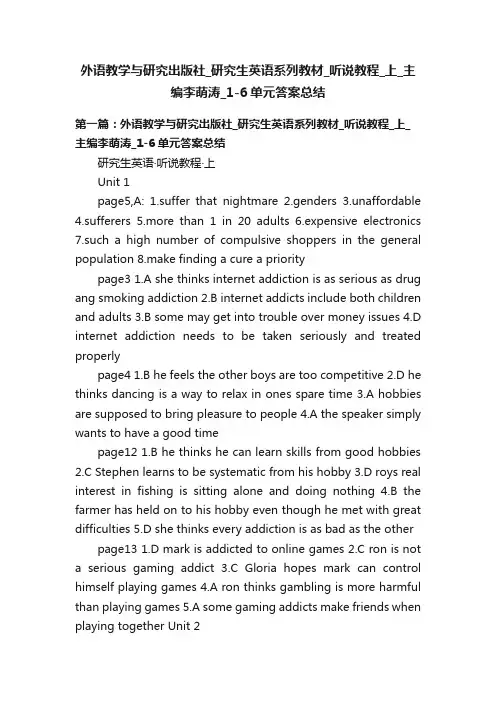
外语教学与研究出版社_研究生英语系列教材_听说教程_上_主编李萌涛_1-6单元答案总结第一篇:外语教学与研究出版社_研究生英语系列教材_听说教程_上_主编李萌涛_1-6单元答案总结研究生英语·听说教程·上Unit 1page5,A: 1.suffer that nightmare 2.genders 3.unaffordable 4.sufferers 5.more than 1 in 20 adults 6.expensive electronics 7.such a high number of compulsive shoppers in the general population 8.make finding a cure a prioritypage3 1.A she thinks internet addiction is as serious as drug ang smoking addiction 2.B internet addicts include both children and adults 3.B some may get into trouble over money issues 4.D internet addiction needs to be taken seriously and treated properlypage4 1.B he feels the other boys are too competitive 2.D he thinks dancing is a way to relax in ones spare time 3.A hobbies are supposed to bring pleasure to people 4.A the speaker simply wants to have a good timepage12 1.B he thinks he can learn skills from good hobbies 2.C Stephen learns to be systematic from his hobby 3.D roys real interest in fishing is sitting alone and doing nothing 4.B the farmer has held on to his hobby even though he met with great difficulties 5.D she thinks every addiction is as bad as the other page13 1.D mark is addicted to online games 2.C ron is not a serious gaming addict 3.C Gloria hopes mark can control himself playing games 4.A ron thinks gambling is more harmful than playing games 5.A some gaming addicts make friends when playing together Unit 2page20,A: 1.Location: Rockefeller Centre, New York 2.Time: right before the Christmas Season 3.Height of the tree: nearly 9 stores 4.Audience: people from all around the country 5.Number of the lights on the tree: 3000 6.Size of the star topper: nearly 10 feet in diameter 7.Material of the star topper: crystal 8.Source of the tree: a home in Connecticutpage29,A: post-vacation depression includes 1.sleeplessness2.loss of appetite 3.irregular heartbeat 4.feelings of despair 5.tiredness 6.stomachache 7.trouble breathing 8.anxiety 9.nervousness10.space the month-long vacation out,11.blow it all at once12.returning on a Monday 13.such blues are temporary 14.don^t make important decisions15.a new period in life 16.personal growthpage20 1.B one can learn a lot about other people and customs through travelling 2.D to make how traveling can win you friends all over the world 3.A they have some language problems and feel a bit afraidpage27 1.A husband and wife 2.D a vacation is even more exhausting 3.D the woman is packing for her bus tour 4.B the bus was too worn out and uncomfortable 5.A 3 hours or so page28 1.B there is a large variety of animals there 2.D tourists are not allowed to take pictures of wild animals there 3.D go horseback riding 4.D it must be a famous geyser 5.B putting out the campfire Unit 3page34,A:Reporter: In Vail, Arizona, a new school 1.in this case involves 2.impact 3.available 4.resources 5.What's the point 6.medium 7.reasoning 8.normal 9.from their perspective 10.opposed to just the one anglepage32 1.B he thought one could simply practice writing by oneself 2.A a person^s thinking patterns are shown in his writing3.D the writer^s reading ability4.D how to put writing skills into practice5.B he will register for an essay-writing course page34 1.D she will celebrate her 95th birthday on Wednesday 2.B she is seeking a BA degree in religion 3.C she completed some of her classes at the Kansas State Teachers College 4.B her son and others will hold a birthday party for her 5.A Nola Ochs has set up a remarkable example as a lifetime learnerpage43 1.C because they took part in a special hardship camp 2.B growing vegetables 3.A mountains that are far away 4.D hardship camps can be an important part of an education for children 5.A they like the idea of organizing hardship camps and support itpage41 1.D He is at a job interview 2.A He suggests the woman keep trying until she gets it right 3.B To receive assistance from the teacher 4.D He wants to keep learning all his life 5.C The man's idea is not feasible at allpage42 1.B smelling 2.D it means acquiring knowledge in one^s favourite way 3.A ted enjoys discussion with others 4.C because mike once took a computer apart to make observations 5.C different people should develop their own suitable learning styles Unit 4page51,A:Beijing Opera is largely seen as a dying art in China 1.devoted puter animator 3.discipline 4.heart-stopping 5.explanation in English 6.much-loved legend 7.supernatural 8.challenge 9.that's within the rules of the opera10.wins good reviews from both Western and Chinese audience members 11.expressing the more acceptable way 12.But the popularity of Beijing Opera is fading fastpage53,A:I hear jill will make her presentation in class today1.That can^t be true2.for certain3.That^s impossible4.might be5.it^s likely that6.Quite possibly7.I know that for sure8.No wonderpage49 1.D he feared his handwriting would not impress his son 2.C children spend a lot of time on the computer 3.A to call on more people to focus on handwriting 4.B most people^s handwriting is worse than their parentspage50 1.D The decreasing sales worldwide 2.A Toys need to be magical and creative 3.B Because Burble stands for an outdate image of women 4.A Barbie dolls may disappear from the market 5.C The Barbie brand will expand to other entertainment fieldspage58 1.A The woman is unhappy about too many advertisements on TV 2.C He is interested in the history of cities shown in pictures 3.D It is about personality evident in an individual’s gestures 4.A The man is a Brazilian 5.A He wants to make his body strongerpage59 1.B culture shock is caused when you feel unfamiliar with the social environment 2.C he might feel anxious,uneasy and frustrated 3.D he thinks such classes can help one become broad-minded 4.A most local customs are learned through social life 5.B one can learn to be involved in a new culture step by step Unit 5page67,A:Thank you very, very much.Well, I just have to start with a 1.challenge 2.beat 3.figure out 4.definition 5.recognize 6.disability mitted 8.tolerate discrimination 9.that is tearing down barriers, both in architecture and in attitude 10.who are helping people with disabilities live independent lives page65 1.C getting information about Habitat for Humanity 2.A it brought about a lot of changes in her life 3.B it^s a unique chance to perform a citizen^s duty to help others 4.C to doone^s share for others is to make our world a better place to live 5.A because Wilbur chose to ask her for the information neededpage66 1.B He was able to share the speaker's feelings 2.D To tell the speaker that he was always ready to offer help 3.C One act of kindness can bring warmth to those in needpage74 1.A She didn’t go to the party yesterday2.C The engine started as soon as they got on the plane3.C Jason can take the test on another day4.C Cheer up and you would be able to get a job soon5.D He was criticized by the woman’s mother all the waypage75 1.D he was the oldest astronaut in space 2.B to do research on how and why people get old 3.C his trip implies what attitude the aged should take towards life 4.B he likes drinking very much 5.A the significance of Mr Glenn^s shuttle trip into space Unit 6page82,A:Damage from acid....“Earth and Sky”.1.widespread2.falling on3.exactly 4.to reliably measure5.assume 6.pollutants 7.Electrical utility plants8.react with9.to get showered 10.with wind currents11.leach bine with13.from fossil fuels.14.dedicated to page81 1.B seeing a wild animal in the zoo 2.C today^s zoos are good habitats for wild animals 3.D to prevent endangered animals from extinctionpage81 1.C They are the threats to species 2.D It can show the importance of protecting the animals 3.B Doing community service reminds a citizen of their responsibility to protect animals page87 1.D How to protect water and trees in nature 2.C It is a good idea for people to make voluntary contributions 3.B Louisiana tornado killed 50 people 4.C He feels it necessary to use animals in medical researches 5.D The two speakers havedifferent opinions about the biggest pollution problem page88 1.D many things can be done to protect the environment 2.A driving steadily will help protect the ozone layer 3.D because they use much too many disposable products 4.C to buy a special“low-flow”shower head 5.B things people can do to reduce pollution第二篇:高等学校研究生英语系列教材_综合教程(下)主编熊海虹课后答案Unit OneTask 11.provinces b.2.woke a.3.haunt b.4.trouble a.5.weathersd.6.wakeb.7.coined c.8.trouble b.9.weather c.10.province c.11.coin a.12.value a.13.haunts a.14.has promised a.15.trouble c.16.coin b.17.promise d, 18.values c.19.refrain b.20.valuede.Task 21.tranquil2.ultimately3.aftermath4.cancel out5.ordeal6.drastic7.legacy8.deprivations9.suicidal 10.anticipated 11.preoccupied 12.adversities13.aspires 14.nostalgia 15, retrospectTask 31.a mind-blowing experience2.built-in storage space3.self-protection measures4.short-term employment5.distorted and negative self-perception6.life-changing events7.all-encompassing details8.a good self-imageUnit TwoTask1I.A.entertainmentB.entertaining2.A.attached B.attachment3.A.historically B.historic4.A.innovativeB.Innovations5.A.flawed B.flawless6.A.controversy B.controversial7.A.revise B.revisionsmentary mentator9.A.restrictive B.restrictions10.10.A.heroicB.heroicsTask 21.ethnic2.corporate3.tragic4.athletic5.underlie6.stack7.intrinsic8.revenue9.engrossed 10.award Task 31)revenues 2)receipts 3)economic 4)rewards 5)athletes6)sponsor 7)spectators 8)maintain 9)availability 10)stadiums11)anticipated 12)publicityUnit ThreeTask 11.B 2, D 1 A 4, C 5, A 6.B 7,C 8.A 9.B 10.CTask2LA.discrete B.discreet C.discretion2.A.auditors B.auditorium C.audit D.auditoryE.auditedA.conception B.contrivance C.contrive D.conceive4.A.giggling B.gasped C.gargling D.gossip5.A.affectionate B.passion C.affection D.passionate6.A.reluctant B.relentless C.relevant7.A.reverence B.reverent C.revere8.A.peeping/peep B.peered C.perceive D.poringTask31)gain 2)similarities 3)diverse 4)enrich 5)perspective6)discover 7)challenging 8)specific 9)adventure10)enlightens11)opportunities 12)memories 13)joyful 14)outweighs 15)span)Unit FourTask 11)uncomfortable 2)reading 3)immerse 4)deep 5)access6)concentration7)stopped 8)altered 9)change 10)different 11)decoders12)disengaged 13)variations 14)words 15)tighterTask 21.D2.A3.B4.B5.D6.A7.C8.CTask 1Step 1l)i 2)f 3)a 4)b 5)h 6)j 7)c 8)e 9)d 10)gStep 21)fidgety2)crushing3)pithy4)foraging5)definitive ,6)propelle d7)applauded8)ubiquity9)duly10)curtailTask 21.above2.on3.to4.on5.on/about6.to7.with8.at9.on/about10.inTask 31.may have a subtle effect on2.provide free access toe-books3.isinthe midst ofa sea change4.has been onthe faculty ofHarvard University5.a voracious book reader6.you'll stay focused onit7.the conduit for information8.your check came asanabsolute godsend9.lost the thread ofthe story10.stroll through elegant proseUnit FiveTask 11.A2.C3.D4.B5.C6.B7.C8.D9.A10.C11.B12D.13.D14.A15.BTask21.sheer2.slip3desert4.revenge5.sheered6.level7.deserted8.sk irted9.protested10.duplicates11.level12.revenge13.skirt14.protes ts15.slip16.duplicate第三篇:研究生英语系列教材多维教程口语考试答案总结一、In my opinion,the problem with many colleges is that they let undergraduatebuild little communities inside their great walls.The university can’t help students see beyond th emselves and better understand the interdependent word.so the students will remain ignorant and indifferent to our world.I think the undergraduate with enlightened leadership is urgently needed.Because this kind of undergraduates are care about people and cultures other than their own,they see beyond themselves and have compassion, integrity and civility.二、If I were the only child of a family with different interests.I would pursue my own dreams, because everyone has his right and ways to live.My parents gave my life, I appreciate it.But even theycan notdecide my life.Besides I think they will be happy if they seeI try my best to pursue my interest.三、I think the automobiles give us lot of convenience to travel one place to another.It saves our time and has been the great liberator, permitting monumental population shifts.As millions of people move to the place that need the labor, our economic opportunities and society improved, this is how the automobiles makes contribution to our society.四、I think not all the married couplesfit for the parenthood.Some people are good at it and they should have children.While others aren’t, and they should feel they have other alternatives.Besides it’s a life-style choice, some people like privacy and leisure, so they are not fit for parenthood.一、Certainly I like my college life.There are only seven classes ina week, so I can spend much time to do something that I really like, such as play basketball(swimming)with my friends , reading a novel with a cup of coffee第四篇:高等院校研究生综合英语系列教材_综合教程(上)课文翻译Unit One核心员工的特征大卫·G.詹森1核心员工究竟是什么样子的?几乎每次进行调查时,我都会从雇主们那里听到“核心员工”这个名词。
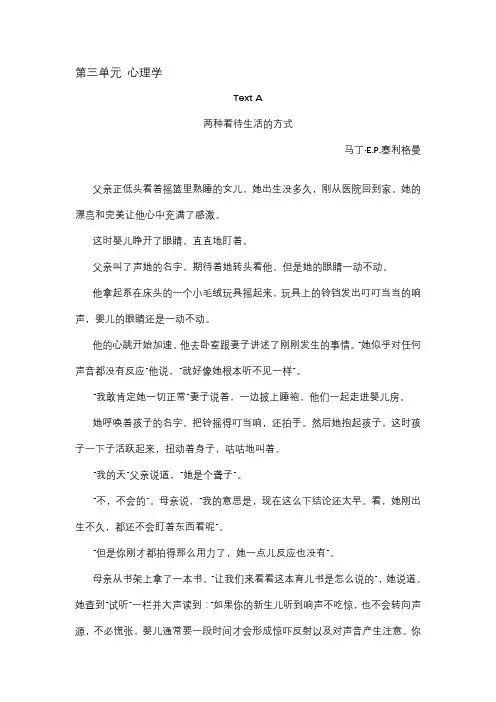
第三单元心理学Text A两种看待生活的方式马丁·E.P.塞利格曼父亲正低头看着摇篮里熟睡的女儿,她出生没多久,刚从医院回到家。
她的漂亮和完美让他心中充满了感激。
这时婴儿睁开了眼睛,直直地盯着。
父亲叫了声她的名字,期待着她转头看他。
但是她的眼睛一动不动。
他拿起系在床头的一个小毛绒玩具摇起来,玩具上的铃铛发出叮叮当当的响声,婴儿的眼睛还是一动不动。
他的心跳开始加速。
他去卧室跟妻子讲述了刚刚发生的事情。
“她似乎对任何声音都没有反应”他说,“就好像她根本听不见一样”。
“我敢肯定她一切正常”妻子说着,一边披上睡袍,他们一起走进婴儿房。
她呼唤着孩子的名字。
把铃摇得叮当响,还拍手。
然后她抱起孩子,这时孩子一下子活跃起来,扭动着身子,咕咕地叫着。
“我的天”父亲说道,“她是个聋子”。
“不,不会的”。
母亲说,“我的意思是,现在这么下结论还太早。
看,她刚出生不久,都还不会盯着东西看呢”。
“但是你刚才都拍得那么用力了,她一点儿反应也没有”。
母亲从书架上拿了一本书。
“让我们来看看这本育儿书是怎么说的”,她说道。
她查到“试听”一栏并大声读到:“如果你的新生儿听到响声不吃惊,也不会转向声源,不必慌张,婴儿通常要一段时间才会形成惊吓反射以及对声音产生注意。
你的儿科医生可以从神经系统方面对孩子的听觉进行测试。
”“瞧”母亲说到,“这样你感觉好些了么?”“没好多少”,父亲说,“它甚至没有提到另一种可能性,也就是孩子是一个聋子。
我只知道我的孩子什么也听不见。
我有一种最可怕的预感。
也许这是因为我的外祖父是个聋子。
如果我们漂亮的宝贝是一个聋子而且是我这边的原因,我将永远无法原谅我自己”。
“嘿,等等,”妻子说,“你不要贸然下结论,星期一我们第一件事就是给大夫打电话。
但是现在,振作起来吧。
来,你抱着孩子,我弄一下毯子,都给拉散了”。
父亲接过孩子但是很快又把她还给了妻子。
整个周末他发现自己都不能打开公文包准备下周的工作。
他跟着妻子在屋里转,满脑子想的都是孩子的听觉问题以及失聪会如何毁了她的一生。
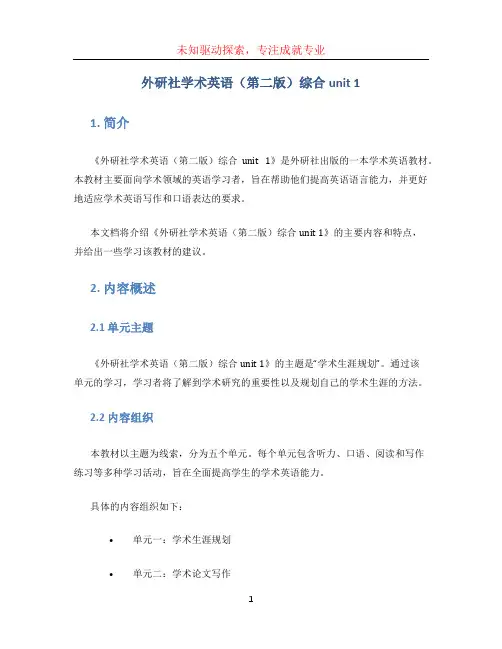
外研社学术英语(第二版)综合unit 11. 简介《外研社学术英语(第二版)综合unit 1》是外研社出版的一本学术英语教材。
本教材主要面向学术领域的英语学习者,旨在帮助他们提高英语语言能力,并更好地适应学术英语写作和口语表达的要求。
本文档将介绍《外研社学术英语(第二版)综合unit 1》的主要内容和特点,并给出一些学习该教材的建议。
2. 内容概述2.1 单元主题《外研社学术英语(第二版)综合unit 1》的主题是“学术生涯规划”。
通过该单元的学习,学习者将了解到学术研究的重要性以及规划自己的学术生涯的方法。
2.2 内容组织本教材以主题为线索,分为五个单元。
每个单元包含听力、口语、阅读和写作练习等多种学习活动,旨在全面提高学生的学术英语能力。
具体的内容组织如下:•单元一:学术生涯规划•单元二:学术论文写作•单元三:学术会议交流•单元四:学术团队合作•单元五:学术发表与出版每个单元的学习内容都根据学术英语的特点和需求进行设计,帮助学生系统学习学术英语的基本知识和技能。
3. 特点分析3.1 学术英语重点梳理《外研社学术英语(第二版)综合unit 1》对学术英语的重点进行了梳理。
教材中涵盖了学术写作、学术口语、学术阅读等方面的内容,具体到每个单元中的不同活动。
3.2 综合能力培养本教材通过对听、说、读、写等不同方面的训练,旨在综合培养学生的学术英语能力。
学生不仅可以提高英语水平,还能够逐步习得处理学术领域相关内容的能力。
3.3 案例分析与实践教材中穿插了丰富的学术案例分析和实践活动。
学生可以通过分析真实的学术案例来深入理解学术英语的要求和规范,并通过实践活动来提高自己的学术英语表达能力。
4. 学习建议4.1 认真阅读教材在学习《外研社学术英语(第二版)综合unit 1》时,要认真阅读教材中的每个单元,理解每个活动的目的和要求。
通过仔细阅读,可以更好地掌握学术英语的相关知识。
4.2 合理安排学习计划由于学术英语的学习需要时间和精力,建议学生合理安排学习计划,将每个单元的学习任务分解到每周或每天,以确保学习效果。
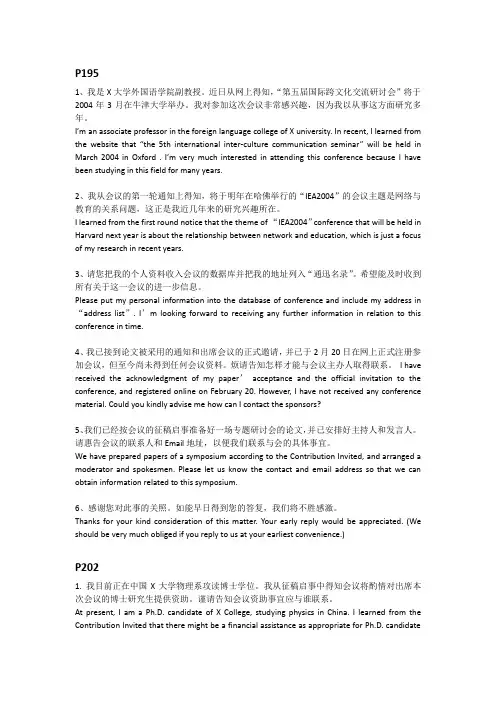
P1951、我是X大学外国语学院副教授。
近日从网上得知,“第五届国际跨文化交流研讨会”将于2004年3月在牛津大学举办。
我对参加这次会议非常感兴趣,因为我以从事这方面研究多年。
I’m an associate professor in the foreign language college of X university. In recent, I learned from the website that “the 5th international inter-culture communication seminar” will be held in March 2004 in Oxford . I’m very much interested in attending this conference because I have been studying in this field for many years.2、我从会议的第一轮通知上得知,将于明年在哈佛举行的“IEA2004”的会议主题是网络与教育的关系问题,这正是我近几年来的研究兴趣所在。
I learned from the first round notice that the theme of “IEA2004”conference that will be held in Harvard next year is about the relationship between network and education, which is just a focus of my research in recent years.3、请您把我的个人资料收入会议的数据库并把我的地址列入“通迅名录”。
希望能及时收到所有关于这一会议的进一步信息。
Please put my personal information into the database of conference and include my address in “address list”. I’m looking forward to receiving any further information in relation to this conference in time.4、我已接到论文被采用的通知和出席会议的正式邀请,并已于2月20日在网上正式注册参加会议,但至今尚未得到任何会议资料。
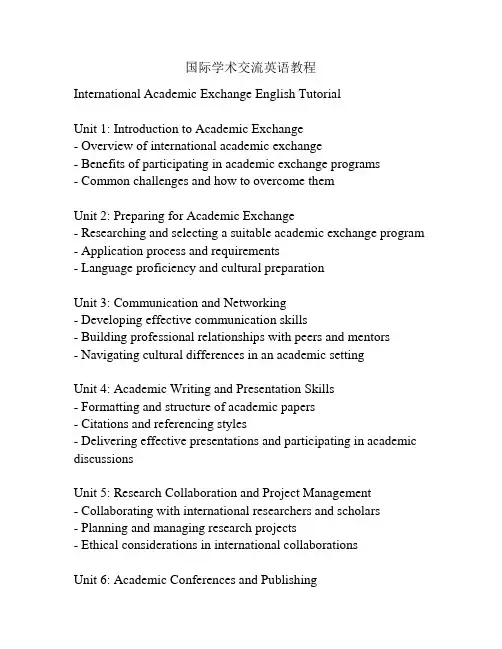
国际学术交流英语教程International Academic Exchange English TutorialUnit 1: Introduction to Academic Exchange- Overview of international academic exchange- Benefits of participating in academic exchange programs- Common challenges and how to overcome themUnit 2: Preparing for Academic Exchange- Researching and selecting a suitable academic exchange program - Application process and requirements- Language proficiency and cultural preparationUnit 3: Communication and Networking- Developing effective communication skills- Building professional relationships with peers and mentors- Navigating cultural differences in an academic settingUnit 4: Academic Writing and Presentation Skills- Formatting and structure of academic papers- Citations and referencing styles- Delivering effective presentations and participating in academic discussionsUnit 5: Research Collaboration and Project Management- Collaborating with international researchers and scholars- Planning and managing research projects- Ethical considerations in international collaborationsUnit 6: Academic Conferences and Publishing- Participating in academic conferences and symposiums- Submitting research papers for publication- Peer review process and dealing with rejectionUnit 7: Funding and Scholarships for Academic Exchange- Exploring funding opportunities for academic exchange- Scholarship applications and writing effective grant proposals- Budgeting and financial planning for international academic exchangeUnit 8: Cultural Immersion and Personal Growth- Embracing and learning from a different culture- Overcoming culture shock and homesickness- Personal growth and development through international academic exchangeUnit 9: Post-Academic Exchange Reflection and Integration- Reflection on the academic exchange experience- Integrating acquired knowledge and skills into future endeavors - Maintaining international connections and opportunities for future collaborationsUnit 10: Case Studies and Success Stories- Case studies of successful academic exchange experiences- Interviews with international students and scholars- Inspirational stories of how academic exchange has impacted their careers and livesNote: This is just a suggested outline for a potential international academic exchange English tutorial. The actual content andstructure can vary depending on the specific focus and goals of the tutorial.。
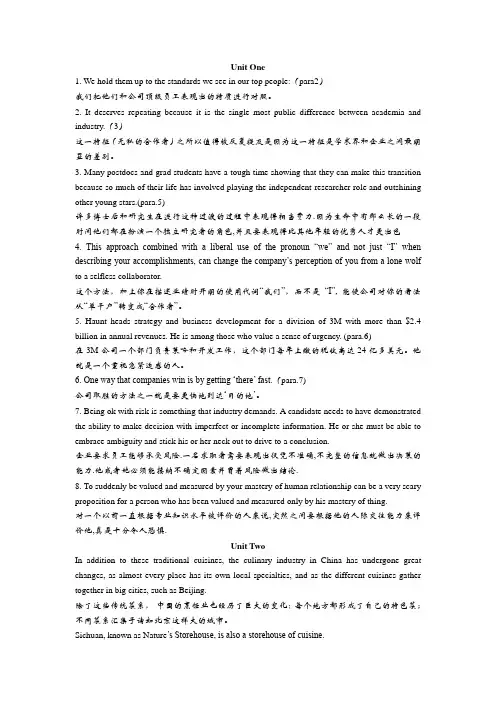
Unit One1. We hold them up to the standards we see in our top people:(para2)我们把他们和公司顶级员工表现出的特质进行对照。
2. It deserves repeating because it is the single most public difference between academia and industry.(3)这一特征(无私的合作者)之所以值得被反复提及是因为这一特征是学术界和企业之间最明显的差别。
3. Many postdocs and grad students have a tough time showing that they can make this transition because so much of their life has involved playing the independent-researcher role and outshining other young stars.(para.5)许多博士后和研究生在进行这种过渡的过程中表现得相当费力.因为生命中有那么长的一段时间他们都在扮演一个独立研究者的角色,并且要表现得比其他年轻的优秀人才更出色4. This approach combined with a liberal use of the pronoun ―we‖ and not just ―I‖ when describing your accomplishments, can change the company‘s perception of you from a lone wolf to a selfless collaborator.这个方法,加上你在描述业绩时开明的使用代词―我们‖,而不是―I‖, 能使公司对你的看法从―单干户‖转变成―合作者‖。
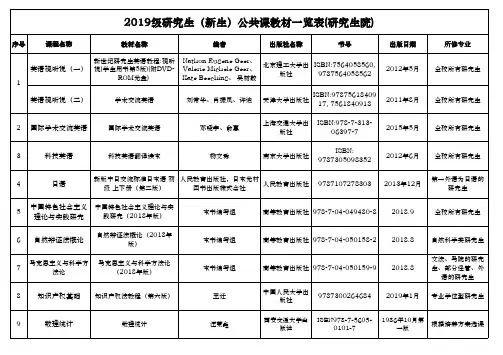

外教社新时代研究生学术英语综合教程2学生用书The world we live in is a vast and complex tapestry woven with the threads of countless stories each one unique and worthy of exploration. Yet amidst this grand tapestry, there are moments, experiences, and perspectives that defy easy categorization or simple labels. It is in these spaces, these None moments, that we find the true essence of the human condition.In a society that often values the tangible, the measurable, and the easily defined, the concept of None can be a challenging one to grasp. It is the absence of something, the void that exists between the known and the unknown, the space where our preconceptions and assumptions are challenged. And yet it is within this very space that we find the opportunity to truly see, to truly understand, and to truly connect with the world around us.Consider the moment of silence that follows a profound loss, the stillness that settles in the aftermath of a profound realization, or the quiet contemplation that emerges when we find ourselves in the presence of something truly awe-inspiring. In these None moments,we are stripped of the distractions and the noise that so often fill our lives, and we are left with the raw, unfiltered essence of the human experience.It is in these moments that we are forced to confront the deepest questions of our existence, the ones that defy easy answers and demand a level of introspection and self-reflection that can be both daunting and transformative. What is the meaning of life? What is the nature of consciousness? How do we find purpose and fulfillment in a world that can often feel cold and indifferent?These are the questions that haunt us, that drive us, and that ultimately shape the course of our lives. And it is in the None moments, the spaces between the noise and the chaos, that we have the opportunity to grapple with these questions and to find the answers that resonate most deeply within us.But the None moments are not just about the profound and the existential. They are also about the simple, the mundane, and the everyday. It is in the quiet moments of contemplation, the uninterrupted stretches of time where we are free to let our minds wander and our thoughts flow, that we find the space to truly appreciate the beauty and wonder of the world around us.It is in these None moments that we can marvel at the intricatepatterns of a snowflake, the gentle sway of a tree branch in the breeze, or the subtle interplay of light and shadow that dances across a wall. It is in these moments that we can truly connect with the natural world, to feel a sense of belonging and interconnectedness that transcends the boundaries of our own individual existence.And it is in these None moments that we can also find the space to connect with one another, to truly see and be seen, to share in the common experiences that bind us together as human beings. It is in the silences between the words, the pauses in the conversation, that we can glimpse the deeper truths that lie within each of us, the vulnerabilities and the fears, the hopes and the dreams that make us who we are.In a world that is increasingly fast-paced, hyper-connected, and filled with distractions, the None moments have become increasingly rare and precious. They are the oases of calm in a sea of chaos, the moments of clarity in a world that can often feel overwhelming and confusing.And yet it is in these None moments that we find the greatest opportunities for growth, for self-discovery, and for true connection. It is in these spaces that we can let go of the masks and the facades that we so often wear and embrace the raw, authentic essence of ourown being.So let us embrace the None moments, the spaces between the noise and the chaos, and let them guide us on a journey of self-discovery and understanding. Let us use these moments to connect with the world around us, to find meaning and purpose in the simple and the profound, and to deepen our connections with one another. For it is in these None moments that we can truly find the essence of what it means to be human.。
外研版英语选修一知识点总结一、词汇。
1. 重点单词。
- academic:adj. 学术的。
例如:The academic performance of students is very important.(学生的学业表现非常重要。
)- province:n. 省。
China has many provinces.(中国有很多省份。
)- enthusiastic:adj. 热心的,热情的。
He is enthusiastic about football.(他对足球很热情。
)- information:n. 信息。
We can get a lot of information from the Internet.(我们能从互联网上得到很多信息。
)- website:n. 网站。
This website is very useful for learning English.(这个网站对学习英语非常有用。
)- comprehension:n. 理解(力)。
His comprehension of the text is very deep.(他对课文的理解很深刻。
)- instruction:n. (常作复数)指示,说明。
Read the instructions carefully before using the machine.(在使用机器前仔细阅读说明。
)2. 构词法。
- 前缀。
- re -:表示“再,又”,如:rewrite(重写),recycle(再循环)。
- dis -:表示“否定”,如:dislike(不喜欢),disappear(消失)。
- 后缀。
- - tion:常构成名词,如:education(教育),communication(交流)。
- - able:常构成形容词,表示“可……的”,如:comfortable(舒适的),acceptable(可接受的)。
二、语法。
1. 时态。
研究生英语国际学术交流Graduate English International Academic ExchangeGraduate students often engage in international academic exchange to enhance their research and broaden their perspectives. International academic exchange can take various forms, including attending conferences, participating in research collaborations, and studying abroad.One popular form of international academic exchange for graduate students is attending conferences. Conferences provide a platform for researchers from different countries to share their findings and discuss their work. By attending conferences, graduate students can learn about the latest developments in their field, receive feedback on their own research, and establish connections with scholars from around the world.Another way for graduate students to engage in international academic exchange is through research collaborations. Collaborative research projects enable graduate students to work with scholars from different countries, bringing together unique perspectives and expertise. These collaborations can result in joint publications, presentations, and the exchange of knowledge and skills.Studying abroad is another avenue for graduate students to participate in international academic exchange. By pursuing a portion of their studies in a foreign country, students have the opportunity to experience different academic systems, learn from renowned scholars, and engage in cross-cultural learning. Studying abroad also enables students to network with international peers and build relationships that can lead to future collaborations and research opportunities.In addition to the academic benefits, international academic exchange offers personal and professional growth opportunities for graduate students. Experiencing different cultures and working with scholars from diverse backgrounds can enhance their intercultural communication skills, adaptability, and problem-solving abilities. These qualities are highly valued in today's globalized world and can greatly benefit their future careers.To engage in international academic exchange, graduate students can explore various resources such as funding opportunities, international research programs, and exchange programs offered by their universities or professional organizations. It is important to plan ahead and carefully consider the goals and objectives of the exchange to make the most ofthe experience.In conclusion, international academic exchange plays a crucial role in the development of graduate students. By attending conferences, participating in research collaborations, and studying abroad, graduate students can expand their knowledge, broaden their perspectives, and establish connections with scholars from around the world. These experiences not only contribute to their academic growth but also enhance their personal and professional development.。
30sGood afternoon, everyone. The title of the paper is Visible Microspectroscopy for Diagnosis of Gastric Precancer. Its author is Liu Yong from Department of Physics, Zhao qing University. It’s presented by Li Mengfan from CAS, Hefei Institutes of Physical Science. You can know more about cancer and the new method to diagnose gastric precancer after reading this paper.58sCancer is very common among human beings. It is mostly related to the habit of the patients, the job, the environment, the drinking water and the soil matters, too. If a person is affected by certain bacteria, he may also get gastric cancer. Bad habits like smoking, drinking, mental tension, eating improperly and living irregularly increase the possibility of having cancer. Before specific treatment, the doctor should make sure whether the patient has cancer and where the focus is. The method used to diagnose cancer and locate thecancerous area is very important.42sBefore we design a method to diagnose cancer, we should know more about cancer like where it starts and what it causes.Firstly, about 90% of the human’s cancer start from the epithelial layer of skin, internal organs and tubular organs in the body. Secondly ,cancer usually accompanied by the changes of organization structure in the cell level.So, the changes which appear in the structure of organization and chemical composition provides important evidence for diagnosis of precancer.42sNormal method to diagnose gastric precancer is Reflectance spectroscopy. It’s very prospective in early diagnosis of cancer and is commonly used these years.One of the most common technology is diffuse reflectance visible spectroscopy, it can acquire the approximate information of the target tissue. This method is low cost, fast and non-invasive, it provides important means for diagnosis of malignant damage of organization of human organs. However, there are also some disadvantages of this method which need to be improved.55sThis is the system of diffuse reflectance spectroscopy, the light beam emitted from the tungsten halogen lamp is guided into the integral ball by the source fiber. The light come out of the integral ball irradiate the standard board, the reflected light of the standard board is treated as the background. Then take target tissue substitute for the standard board, and scan the reflected light of it. The reflected light spectra of the gastric tissue mucosal layer and the submucosa layer is guided into the spectrometer by the collector fiber. The spectrometer and the computer is connected by USB, spectrum can be processed using computer.36sFirst of all, only average visible spectrum of the target tissue can be acquired, it means that the docters cannot make out the location of the cancerous tissue precisely.What’s more, the device is easy to be affected by changes of optical path length induced by different set-up of prober and the variation of hemoglobin concentration due to the pressure between prober and tissue.50sTo avoid the problems of the commonly used techniques, diffuse reflectance visible spectroscopy, scientists do a lot of researches to find out a new way to diagnose precancer.The new method is Visible Microspectroscopy. The visible microspectroscopic measurement device is accomplished on the basis of fiber confocal microscope, its 3-d imaging principle devote to the optical tomography ability of the system.The visible microspectrum of cancerous and normal tissue can be analysed andcontrasted, so it’s more useful than the normal method.45sThis is the structure of the visible microspectroscopy device .The fiber coupler can separate the lighting beams from the signal beam. The two lens can focus the light on the tissue ,The 3-D electronic controlled platform move along the direction of optic axis, so that the device can acquire the visible microspectroscopy signal of the sample in different depth, precisely locate the boundary of the cancerous tissue.The signal measured from different position can be stored in the computer after analysed by the spectrometer.31sThis is the spectrum chart of the normal tissue and cancerous tissue, they are analyzed by the spectrometer before being transmitted to the computer. The upper chart is the visible spectrum of normal tissue, it is regular. Contrasting to this, in the nether chart, the spectrum of the cancerous area shows that the strength of reflected light grows as the wave length grows.49sIn comparison with the normal method, there are a lot of advantages of the new method.Firstly, the structure of visible microspectroscopy device is very simple. The main parts consist of source, fiber coupler, 3-D electronic controlled platform, spectrometer and the computer.Secondly, the 3-D space microspectrum can be acquired , which can help the doctors efficiently make out whether the gastric tissue is cancerous.What’s more, the optical tomography ability enabled the device to precisely locate the edge of the cancerous area.32si.In conclusion, the main goal of this research is to find a new way to diagnose thegastric precancer.ii.The spectrum of the normal and cancerous gastric tissues which can be measured by visible microspectroscopy in cell level is the central idea .iii.This new method can obtain the cell level information, and is not affected bychanges of optical path length and hemoglobin concentration.50si. The device is very simple, so it can have a small size, which can reduce the sufferings of patients.It can efficiently make out whether the tissue is canceration.ii. Besides, the 3-D space microspectrum and optical tomography ability can make the device accurately distinguish the cancerous tumor area from the normal tissue in cell level, thus the boundary of the cancerous tissue can be ascertained accurately.iii. The result of the research shows that this device may be used to non-invasively diagnosis of early gastric cancer.20sThis device is only researched in the lab, there are still a lot of works to do to make this device applied into practice. So, s pecial design of this device should be made which can be applied to the medical diagnosis.给大家推荐一个英语微信群Empty Your Cup英语微信群是目前学习英语最有效的方法,群里都是说英语,没有半个中文,而且规则非常严格,是一个超级不错的英语学习环境,群里有好多英语超好的超牛逼的人,还有鬼佬和外国美眉。
《国际交流英语(yīnɡ yǔ)》(英才(yīngcái)学院)课程(kèchéng)教学大纲课程(kèchéng)编码:GC15000600课程名称:国际交流英语(yīnɡ yǔ)课程英文名称:English for International Communication总学时:40 讲课学时:32 实验学时:0 上机学时:0 辅导学时:8学分:1.5开课单位:外国语学院大学英语第三教学部授课对象:英才学院学生开课学期:2秋先修课程:综合英语、高级英语主要教材及参考书:教材:周之南、韩晓蕙.《国际交流英语》. 哈尔滨: 哈尔滨工业大学出版社.2012.主要参考书:1. Joyce Slayton Mitchell.《美国本科留学指南》. 北京:群言出版社. 2010.2. 贾卫国.《国际学术交流英语》. 北京:外语教学与研究出版社.2008.3. Robert Day. 《How to Write and Publish a Scientific Paper》. 北京:北京大学出版社. 2006.4. 从丛、李咏燕.《学术交流英语教程》. 南京:南京大学出版社. 2003.5. 冯幼民.《高级英文写作教程》. 北京:北京大学出版社. 2002.一、课程教学目的《国际交流英语》是面向英才学院二年级学生开设的一门英语必修课程。
本课程培养具有能够参与国际事务与国际竞争的高层次国际化人才,体现大学英语教学的人本化服务意识,为学生成功申请国际交流项目提供相关的帮助,更好贯彻落实研究型、个性化、精英式的人才培养理念。
课程介绍了国际交流中的日常交流、学术交流和商务交流三大方面。
通过课程的任务型学习,学生将基本了解日常交流必备的英语知识、申请国外大学的步骤和申请材料的准备,以及国外大学学习生活交流;掌握国际交流中所需的英语各类技能。
教学材料选择真实性场景的语料,为学生提供模拟真实语境进行语言演练。
外研社教学课件跨文化国际传播英语教程 U1-1介绍外研社教学课件跨文化国际传播英语教程 U1-1是一套专门针对英语学习者的课程教材。
这套教材旨在帮助学生提高他们的英语水平,并且增进对跨文化和国际传播的理解。
教学目标通过学习这个单元,学生将能够达到以下目标: 1. 理解和运用与跨文化和国际传播相关的词汇和表达方式。
2. 能够识别和分析不同文化之间的差异和相似之处。
3. 能够运用所学知识进行跨文化交流,并理解在国际传播中的重要性。
教学内容这个单元涵盖了以下主题: 1. 跨文化传播的定义和意义 2. 国际传播中的语言交流技巧 3. 跨文化交流的误解和解决办法 4. 国际传播中的文化差异和相似之处教学资源外研社教学课件跨文化国际传播英语教程 U1-1提供了丰富的教学资源,包括但不限于: 1. 课件演示文稿:用于教师展示课程内容的幻灯片演示。
2. 教师讲义:提供教师对课程内容的详细分析和解释。
3. 学生用书:学生用以参考和学习课程内容的书籍。
4. 作业和练习册:提供给学生练习和巩固所学知识的练习册。
教学方法教师可以采用多种教学方法来教授这个单元的内容,包括但不限于以下方法: 1. 讲解和讨论:教师可以通过讲解和讨论的方法向学生介绍和解释课程内容。
2. 视听材料:教师可以使用相关的视听材料来帮助学生更好地理解课程内容。
3.小组活动:教师可以组织学生进行小组活动,让他们在实践中运用所学知识。
4. 案例分析:教师可以使用实际案例来帮助学生更深入地理解跨文化和国际传播的概念。
评估方式教师可以使用多种评估方式来评估学生对这个单元内容的理解和掌握程度,包括但不限于以下方式: 1. 课堂表现:观察学生在课堂上的参与和表现情况。
2. 作业和练习:评估学生在作业和练习中对所学知识的运用情况。
3. 小组活动和讨论:观察学生在小组活动和讨论中的表现和贡献程度。
4. 考试和测验:组织考试和测验来测试学生对所学知识的掌握程度。
Task 1 Call for Conference PapersThe planning process for holding a conference should begin very early. A chairperson is selected to make the plan. Various committees are formed, with members in charge of specific activities. These committees generally consist of Conference Organizing Committee and Conference Academic Committee. The committees are then to work out a general program, including a call for papers, which is to notify the prospective participants of the conference.Format of call for conference papers·Theme and/or background·Conference objectives·Topics to be discussed·Time and venue·Papers and submissions·Organizing institution and committee·Contact informationSampleConference Goals:To promote the study of material science in China; to introduce the development of the research work; to discuss the important issues in the field; to provide opportunities for international communication; to promote the understanding of related disciplines; to explore future cooperation possibilities between the countries.Topics to be Discussed:Papers are solicited on theoretical issues and their applications related to crystal materials. Suggested topics include but are not limited to:Papers and Submissions:Authors are invited to submit full papers, up to six pages, with the authors’names and affiliations, complete address (including email, fax and phone number of the corresponding author), before April 10,2006, by email to . The language is Chinese or English. The papers will be reviewed by the program committee based on content, presentation and suitability for the conference. The papers must be in an MS word or Latex format (A4, single space, Songti, 10 points if in Chinese, or Times New Roman, 12 points if in English). More detailed information will be available on the web page: .Useful Expressions and Sentence Patterns1. Call for papers·Papers are being invited for TI 83rd World Conference to be held in Shanghai, May 23-27, 2004. ·Titles of proposed papers with a 200-word abstract should be submitted no later than May 10, 2006.·The IASTED Secretariat must receive your paper by July 15, 2006.2. Submission·The submitted papers should be original and have not been published elsewhere.·Best papers will be selected by the Advisory Committee and Program Committee, and the authors are invited to submit their papers to an international journal.·For all submissions, please include the following information: title of the paper, name, affiliation, address, phone number, email, and audiovisual request.·Abstracts are invited for 20-minute talks followed by 10 minutes of discussion addressing any topic in the areas of Asian environmental protectio n…3. Format and length·Abstracts should be submitted electronically in an MS Word format and sent by email to the conference secretariat.·Authors of accepted papers should send the full text paper in format of PDF or MS Word before September 15, 2006 to with attachment.·All submissions should be in Adobe Acrobat (.pdf), postscript (.ps), or MS Word (.doc) format. ·Initial paper submissions should be approximately ten pages.4. Notification of acceptance and refusal·Notification of acceptance will be sent via email by August 1, 2006.·Receipt of paper submission will be confirmed by email.·Submissions received after this date will not be given primary consideration.·Acceptance of the paper will be confirmed by JICC 2006 Program Committee based on content quality of the extended abstract.·Late registration fees or paper submissions will result in papers being excluded from the conference proceedings.Called to order by the presiding officer主持人致辞roll call点名announcement of quorum宣布大会决议reading of the minutes of the previous meeting宣读前期会议纪要approval of the minutes of the previous meeting通过前期会议纪要related matters相关事宜unfinished business未尽事宜appointments and removal任命及离任nomination and elections提名及选举adjournment休会opening ceremony开幕式keynote speech主题发言forum论坛plenary session全体会议poster session论文展示panel session专题讨论会discussion / question & answer session讨论/提问与回答时间field trip考察活动closing ceremony闭幕式reception/banquet招待晚宴Task 1 Letters of Invitation Before the international conference, the conference host or organizer(s) will send invitation letters to famous scholars and experts in the field and invite them as keynote speakers to the conference. They will also invite other prospective authors to present their new ideas, valuable works, and ongoing research at the conference. These letters are formal letters and therefore should bear all the necessary information about the occasion(s), and express the host’s sincerity and hospitality toward the attendees.在国际会议,会议主持人或组织者()将发送邀请信,著名学者在该领域的专家和邀请他们作为主讲人会议。